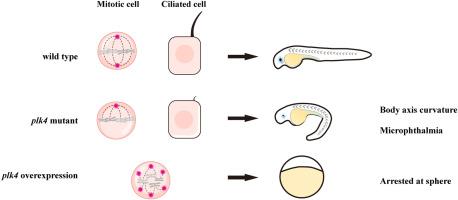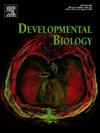Plk4调控斑马鱼胚胎发育过程中的中心粒复制
IF 2.5
3区 生物学
Q2 DEVELOPMENTAL BIOLOGY
引用次数: 0
摘要
PLK4 在中心粒复制过程中发挥着关键作用,而中心粒复制对于维持细胞分裂、细胞骨架稳定性和纤毛形成等细胞过程至关重要。然而,人们对 PLK4 的作用机制仍不甚了解,尤其是在脊椎动物的胚胎发育过程中。在这项研究中,我们观察到 Plk4 功能障碍会导致斑马鱼胚胎发育异常,表现为皮肤变黑、起皱、小眼球和体轴弯曲等症状。在plk4突变体中,中心粒复制缺陷导致细胞分裂异常、细胞凋亡和纤毛发生缺陷。此外,在斑马鱼胚胎中过表达 plk4 会导致中心体过度扩增,通过异常细胞分裂破坏胚胎胃形成,最终导致胚胎死亡。此外,我们还发现由两个 PB(PB1 和 PB2)组成的 "隐性 "polo 盒(CPB)结构域是 Plk4 的关键中心体定位结构域。令人惊讶的是,仅过量表达这两个 PB 结构域就足以诱导胚胎死亡。此外,我们还发现了一种CPB的截短形式,它能定位到中心体而不会导致胚胎发育缺陷。我们的研究结果表明,Plk4 严格控制着斑马鱼早期胚胎发育所必需的中心体复制。本文章由计算机程序翻译,如有差异,请以英文原文为准。

Plk4 regulates centriole duplication in the embryonic development of zebrafish
PLK4 plays a crucial role in centriole duplication, which is essential for maintaining cellular processes such as cell division, cytoskeletal stability, and cilia formation. However, the mechanisms of PLK4 remain incompletely understood, especially in the embryonic development of vertebrate species. In this study, we observed that Plk4 dysfunction led to abnormal embryonic development in zebrafish, characterized by symptoms such as dark and wrinkled skin, microphthalmia, and body axis curvature. In plk4 mutants, defects in centriole duplication led to abnormal cell division, apoptosis, and ciliogenesis defects. Moreover, overexpression of plk4 in zebrafish embryos caused excessive centrosome amplification, disrupting embryonic gastrulation through abnormal cell division and ultimately resulting in embryonic lethality. Furthermore, we identified the "cryptic" polo box (CPB) domain, consisting of two PBs (PB1 and PB2), as the critical centrosome localization domain of Plk4. Surprisingly, overexpression of these two PB domains alone was sufficient to induce embryonic lethality. Additionally, we discovered a truncated form of CPB that localizes to the centrosome without causing defects in embryonic development. Our results demonstrate that Plk4 tightly controls centriole duplication, which is essential for early embryonic development in zebrafish.
求助全文
通过发布文献求助,成功后即可免费获取论文全文。
去求助
来源期刊

Developmental biology
生物-发育生物学
CiteScore
5.30
自引率
3.70%
发文量
182
审稿时长
1.5 months
期刊介绍:
Developmental Biology (DB) publishes original research on mechanisms of development, differentiation, and growth in animals and plants at the molecular, cellular, genetic and evolutionary levels. Areas of particular emphasis include transcriptional control mechanisms, embryonic patterning, cell-cell interactions, growth factors and signal transduction, and regulatory hierarchies in developing plants and animals.
 求助内容:
求助内容: 应助结果提醒方式:
应助结果提醒方式:


